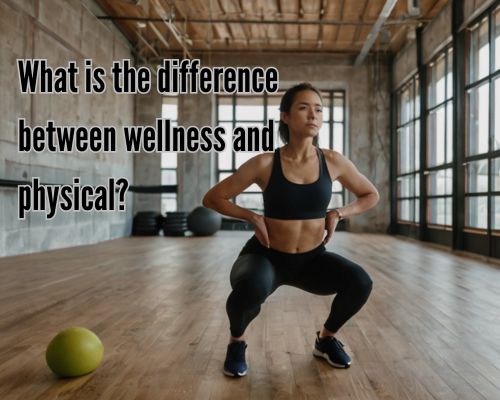What is the Difference Between Wellness and Physical: A Comprehensive Analysis
When exploring the concepts of wellness and physical health, it’s important to understand how they relate and differ.
Wellness is a comprehensive approach that involves physical health, mental, emotional, social, and spiritual dimensions. It’s an active, ongoing process of achieving a balanced and fulfilled life.

Conversely, physical health focuses specifically on your body’s condition, the absence of disease, and the ability to perform daily tasks with ease.
It’s an essential component of wellness but does not capture the entire picture of one’s well-being. Incorporating regular exercise, balanced nutrition, and adequate sleep contributes to maintaining good physical health.
“Distinguishing between wellness and health is crucial for a deeper understanding. Health can be viewed as a state of being free from illness, while wellness represents the active pursuit of a vibrant and satisfying life across multiple facets.” said Jane Benson from Bikram Yoga Mornington.
Embracing wellness ensures that you’re not just aiming for physical health but thriving in all areas of your life.
Exploring the Concepts of Wellness and Physical Health
Understanding wellness and physical health involves recognising their unique features and interconnections.
Wellness encompasses various dimensions contributing to overall quality of life, while physical health specifically targets the body’s functioning and maintenance.
Defining Wellness and Physical Health
Wellness is a comprehensive concept that includes multiple dimensions, such as mental, social, and emotional well-being. It promotes a lifestyle aimed at enhancing your overall quality of life.
Physical health, by contrast, focuses on the condition and performance of the body systems.
This includes regular exercise, balanced nutrition, and preventative health care to ensure your body functions optimally.
The distinction is that wellness forms the broader category, incorporating diverse lifestyle aspects to foster holistic well-being. In contrast, physical health targets the body’s capabilities and condition.
Dimensions of Wellness
Wellness goes beyond physical well-being and involves various dimensions.
Mental wellness supports emotional and psychological stability, crucial for a balanced lifestyle.
Spiritual wellness encourages pursuing purpose and meaning, grounding your life experiences in values and beliefs.
Social well-being is essential for nurturing relationships and community connections.
Environmental wellness highlights a conscious interaction with your surroundings and the impact they have on your life quality.
Each dimension actively contributes to a fulfilling and harmonious life. Wellness requires a commitment to integrate these facets into your daily routines, leading to improved overall satisfaction. See Jane Benson from Bikram Yoga Mornington for more.
The Role of Physical Health in Overall Wellness
Physical health is a fundamental pillar of overall wellness, providing the basis for engaging in various wellness dimensions.
Good physical health enables you to be active, maintain balanced emotions, and improve mental clarity.
It supports adequate nutrition and sleep patterns, boosting energy levels and resilience.
Physical wellness involves consistent activity, self-care, and health check-ups to maintain body systems in peak performance.
Physical health’s contribution to wellness highlights the need for an integrated approach.
By attending to your physical health, you enhance other aspects of wellness, ultimately promoting a more balanced and fulfilling lifestyle.
This synergy illustrates how caring for the body positively impacts your overall quality of life, intertwining with other wellness dimensions.
Lifestyle Factors Influencing Wellness and Physical Health
Several lifestyle factors play a pivotal role in influencing both wellness and physical health.
Key elements include maintaining proper nutrition, engaging in regular physical activity, supporting mental and emotional health, and fostering social connections.
Nutrition and Balanced Diet
Eating a well-balanced diet is essential for both physical health and overall wellness.
Prioritise whole foods, such as fruits, vegetables, lean proteins, and whole grains. Limit consumption of processed foods high in sugar and unhealthy fats.
Aim to follow dietary guidelines, such as those outlined by the World Health Organization, to ensure your body receives essential nutrients.
A balanced diet supports energy levels, boosts the immune system, and helps maintain a healthy weight, all contributing to optimal wellness and health.
Physical Activity and Fitness
Regular physical activity is crucial for maintaining fitness and enhancing wellness.
Incorporating activities like walking, swimming, or cycling into your routine can significantly improve cardiovascular health.
Aim for at least 150 minutes of moderate aerobic activity per week as recommended by health experts.
Physical activity not only strengthens muscles and bones, but it also enhances mental health by releasing endorphins and reducing stress levels. Consistent exercise can increase longevity and life quality.
Mental and Emotional Well-Being
Your mental and emotional health is a core component of overall wellness.
Practicing mindfulness, yoga, or other relaxation techniques can help manage stress. These activities foster a positive mindset and emotional resilience, which are crucial in navigating daily challenges.
Being proactive in seeking support when needed, such as counselling or therapy, is also beneficial.
Taking care of your mental health can lead to improved focus, better decision-making, and enhanced quality of life, contributing to both personal and social well-being.
Social Connections and Social Wellbeing
Maintaining strong social connections enhances social wellbeing. It also contributes significantly to overall wellness.
Participate in community activities or engage in social groups to nurture relationships. Building a supportive network can offer emotional support and improve mental health.
Quality relationships help alleviate feelings of loneliness. They also contribute to a greater sense of belonging.
Prioritising time with family and friends strengthens bonds. It also creates a positive social environment, contributing to improved well-being and a healthier lifestyle.